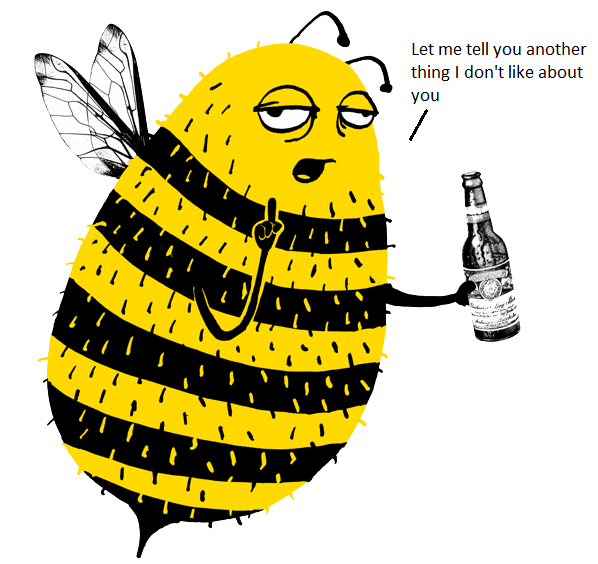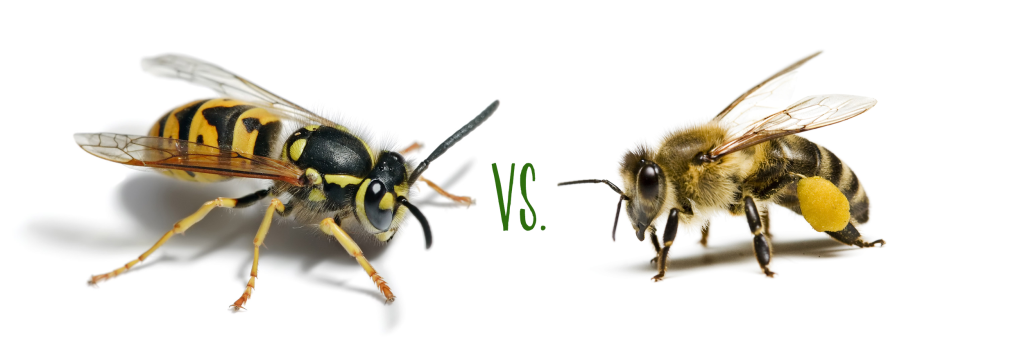We’ve all been there – trying to have a nice family barbeque, or a little family get together when an unwanted visitor decides to drop by. This unwanted guest might be like your dodgy Uncle Rodney, who obnoxiously helps himself to your food and talks to close too your face, or it might be an unwelcome relative of the honeybee – another character who ruins barbeques by eating your food, drinking your drinks and getting up in your face for no good reason.

Both Honey Bees and Wasps (along with ants) are members of the order Hymenoptera; however they are classified into different families.
Wasps, are members of the family vespidae which is made up of a variety of eusocial and solitary wasps.
This family is distinct from apidae, the family of bees. Apidae contains honey bees, bumble bees and thousands of other species, all of which originated and descended from a prehistoric predatory wasp over 120 million years ago.
This post will focus on wasps of the vesipdae variety, and not on WASPs of the White-Anglo-Saxon-Protestant variety – even though those WASPs sometimes ride vespas, which just serves to confuse things, aside from being a handy way to meet up with other puritanical buzz kills.

How can I tell the difference between Honey Bees and Wasps?
If your kids says, “Ow! Mom, I got stung by a bee!” they are WRONG. It was almost certainly a wasp and while it sucks they got stung by a malicious little devil, they shouldn’t mar the good name of honey bees by blaming them for the sting. Let’s look at some of the key differences.
While Honey Bees and Wasps have a lot in common, there are some notable differences that will help you quickly differentiate between the culprits that are trying to steal your hamburger and the little angels that are pollinating your raspberry plants.

Wasps
Honey Bees
Fashion Sense
Wasps are usually more slender than honey bees. They follow more of a punk rock vibe with smooth and shiny bodies with bright yellow and black markings – basically nature’s way of saying ‘piss off’.
Honey bees are typically more stout and robust than wasps. They have more of a flower child chic with earthy tones and a fuzzy appearance due to the fine hairs covering their bodies.
Dining Preferences
Wasps are carnivores and scavengers. They like to eat meat, sugary substances and even fermenting fruits. That is why they invade your BBQ to try and eat your hamburger and drink your beer (or Smirnoff ice – no judgement here).
Honey bees are herbivores and primarily forage for nectar and pollen from flowers. They play a crucial role in pollination and are essential for the reproduction of many plant species and are not interested in trying to eat a piece of your hot dog.
Nesting Habits
Wasps build nests in underground burrows, in tree hollows, or in man-made structures like buildings and attics. Their nests are made from paper-like material created by chewing wood fibers mixed with saliva.
Honey bees create hives with wax combs inside cavities or hollow wooden spaces. These hives are generally found in specially designed wooden hives, built by beekeepers specifically for the bees to live in.
Propensity to Sting
Wasps are be more aggressive and are more likely to sting unprovoked, especially when they feel their nest is threatened, or you won’t give them a sip of your bacardi breezer. Since they also nest in the ground, there are more instances of people walking close to their nests and drawing their ire. Wasps have a barb-less stinger and can sting multiple times.
Honey bees are less likely to sting unless they feel they (or their hive) is directly threatened. Generally, the only time a bee will sting you is if you happen to step on one while walking barefoot through clover or other flowery meadow. Honeybees die after stinging once as their barbed stinger essentially eviscerates them when it gets stuck in people’s skin.
Lifecycle
Wasps have an annual life cycle. Colonies die off in the fall – so in the late summer wasps are particularly aggressive as their colony is collapsing and they just want some tasty food before they go. New queens escape the dying colony to find dry nooks and crannies to hole up over winter and then come out to start new colonies each spring.
Honey bee colonies can survive year-round. They store food for the winter (that is what all the honey is for) and huddle together and shiver their way to warm their colonies through the colder months. Their colonies start to expand in the late Winter and reproduce by swarming in the Spring.

Ok I understand the difference – but why are wasps such jerks?
Wasps are scavengers and predators, and they are attracted to sugary foods, meats, and other human consumables. This can lead to encounters with humans at picnics or outdoor gatherings, where they might seem like they are bothering people. When people start flailing and swatting at the wasps, this makes the situation worse as it is interpreted as a threat by the wasps and leads to the wasps ‘smelling fear’ and becoming defense – aka stinging.

If there is a loving god, why would they create wasps?
Funny enough, you aren’t the first person to ask this question, and not even the second or third. Google provided me links with several online theological blogs that debated this very question. The divine reasons generated ranged from :
- “They say God works in mysterious ways and if so, that’s certainly the case when it comes to these stripey, flying psychopaths.”
- “In the book of Joshua, God deployed wasps, or hornets, to defeat not one but two kings and their armies. The Amorites were an accomplished and formidable foe.”
- “One, they look cool. Yellow and black look good together: just witness the way everyone wants yellowjacket wasps on their logos.”
- “The answer is simple….Adam’s sin had negative consequences throughout the cosmos, including all living creatures.” (That’s a pretty heavy penalty for eating an apple – paraphrasing Han Solo “Great, Adam. Great, always thinking with your stomach!”)

I remain agnostic on these reasons and hold a view that wasps fill a niche in the ecosystem by controlling other insect populations that would otherwise become pests and providing some limited pollination. In my mind, they play a role similar to wolves in the natural world. Just as wasps, often misunderstood due to their perceived aggressive behavior, help control insect populations and serve as pollinators, wolves, despite their reputation as predators, play a crucial role in maintaining the health of ecosystems by controlling prey populations and shaping the behavior of their prey. Both these species impact the biodiversity and dynamics of their environments, highlighting how seemingly “negative” interactions are essential for the overall stability and function of natural systems. Understanding their roles underscores the importance of every species, no matter their public perception, in contributing to the intricate tapestry of life on Earth.
I like the analogy because it also would be super annoying if a pack of wolves showed up at your barbeque and tried to eat your hamburgers – but in the natural world, they are a vital part of a healthy ecosystem.
That’s nice to know, but I still hate having them around my house – what do I do?

The Power Rangers employed cooperation and special powers to convince Waspicable to become kind; however, I believe the best way to keep them away is to employ a two pronged approach similar to how you keep weird uncle Rodney away:
- Prevent them from coming around
- Keep all food, drinks and garbage tightly sealed, pick up any fruit that has fallen from fruit trees – this is what attracts them in the first place. Wasps like to drink alcohol as it reminds them of rotting fruit – and just like Uncle Rodney, they are way more annoying when they are drunk.
- Try hanging a fake wasp nest outside over the spring and summer – wasps are territorial and will avoid places where they think other wasps have set up.
- Use window screens, seal up holes and inspect eaves and overhang for nests in the spring – they are easier to get rid of when they are small.
- Get rid of them once they are here
- DIY Wasp Traps – an easy method is to cut a two-litre pop bottle in half and invert the top half into the bottom. Fill it up with some sugary juice, watery fruit and/or alcoholic drink (maybe the bottom of an unfished White Claw) and set out where you want to catch them.
- Professional Wasp traps – available at almost any hardware store and means you don’t have to waste any of your sweet drinks.
- Call pest control – If you come across a big nest and don’t want to get stung, you can leave it to the experts. Or you can just go for it like my friend Andy who killed an entire wasp nest with a strategically placed weed-eater attack.
- Wait them out – by mid fall, the colonies will have died and you will have peace until next year.
As I beekeeper, I have a hard time feeling any affection for wasps. In the dog days of summer, wasps relentlessly harass and attack beehives – trying to get past the guard bees and raid the hives honey stores and eat the baby bees. I combat this by not leaving any honey or food sources lying around, putting entrance reducers in the hives to give the bees a smaller entrance to defend and employing a liberal amount of wasp traps baited with the finest rotten fruit and alcopop’s to lure and trap the fiends – it turns out Adam isn’t the only one who can’t resist some forbidden fruit!
But I try to remember that wasps are multifaceted creatures and my encounters with them are only one aspect of their existence. Like Uncle Rodney, who is both super annoying at barbeques and family gatherings – but also a valued member of his slo-pitch team and a helpful resource at the plumbing supply warehouse.
I hope this has provided some useful information to help you understand wasps – there is still lots more to write about – invasive murder hornets, the schmidt sting pain index, chemical composition of venom, allergic reactions, whether wasps are capable of love? But those are topics for another day. If you do want more information, I have included some additional links below. In the meantime –
Stay Sweet,
E
Related Links:
https://www.almanac.com/wasps-bees-and-hornets-whats-difference
https://www.nhm.ac.uk/discover/what-do-wasps-do.html
https://lifeandtrendz.com/food-and-drink/5-best-delectable-bacardi-breezer-flavours-to-try